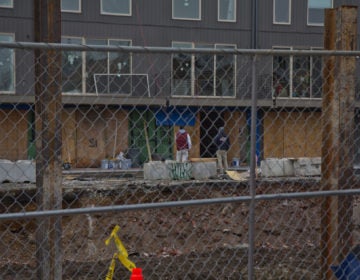Philly software snafus could affect your property tax bill
An upgrade to Philadelphia’s property assessment system has created problems for homeowners who bought into the city’s 10-year tax abatement.

Tom and Leah Fail at their home in Philadelphia’s Fishtown neighborhood. (Kimberly Paynter/WHYY)
Critics have called on Philly to abolish its 10-year property tax abatement for years — but the city’s own tax assessors office may be doing the job for them.
An effort to make the City of Philadelphia’s property assessment system “more efficient and transparent” has effectively locked some recent homebuyers out of the city’s 10-year tax abatement altogether, officials now say.
Mike Dunn, a spokesperson for Mayor Jim Kenney, said an effort that began in January to migrate property tax assessment records over to a new digital system — known as the Computer Assisted Mass Appraisal system — had effectively “frozen” many homeowners tax bills.
But the record-keeping freeze, Dunn said, had the side effect of halting the automatic application of the 10-year tax abatement — setting up some homeowners who received the perk to be taxed at the higher, unabated rate.
“The data had to be frozen late last year in order to be converted to the new system,” Dunn said. “With the data frozen, we were not able to change any assessed values, such as … moving a portion of the assessment from taxable to exempt.”
City officials expected to finish transferring tax records to the new system by the end of the fiscal year on June 30. Delays have stymied progress though and Dunn said he wasn’t sure when the process would conclude. He said the COVID-19 shutdown has added to the delays.
Roughly 15,600 properties citywide currently benefit from the 10-year tax abatement. While Dunn said the city believed that most tax-abated properties that were recently bought or sold were not affected by these record-keeping delays, he could not say for certain.
“We do not have an estimate as to how many accounts are impacted, as our previous system did not have such tracking capabilities,” Dunn said.
A note that appeared on the Office of Property Assessments website this spring also mentions the office is “upgrading its computer systems.” But the broader attempts to overhaul OPA record keeping to the CAMA system date back as far as 2013 and have been delayed for years.
Leo Addimando, head of the Building Industry Association of Philadelphia, said the developers’ trade group was aware of the recent data migration issue. But other, similar issues dogged the abatement process even before the integration of CAMA, he said.
“There are all sorts of glitches and other paperwork processing errors with the abatement. This has been the case for years,” Addimando said. “The city has been responsive, even if slow, to fix these errors as they come up.”

Subscribe to PlanPhilly
Homeowners began complaining about problems before January when the latest glitch erupted.
Tom Fail purchased his Fishtown home last August. Already approved for the 10-year tax abatement, the tax bill on the renovated $517,000 property was supposed to be about $1,200 a year. But nearly a month later, mortgage documents show he was paying the full amount, $5,100 a year.
Fail first reached out to the city about the issue in September 2019, and a customer service rep blamed a software upgrade issue, he said.
Fail said he recognized that he was not the poster child for a vulnerable homeowner, but suspected that many other recent homebuyers might be having similar issues.
“I felt guilty reaching out,” he said, of his initial exchange with the city. “But people are making cognizant decisions to purchase homes based on this benefit. And there are going to be some people who legitimately can’t make up that difference.”
Dunn initially credited Fail’s problems on the recent software upgrade, but later acknowledged that an OPA evaluator had failed to update the assessed value of Fail’s home well before the changeover began. The current data migration issue was now slowing the city’s process of correcting that oversight.
He promised the city would correct issues with Fail’s account — now almost a year since he had moved in.
“I would understand if I applied in 2020, but the city had approximately eight months before coronavirus started up to process my request,” Fail said. “It’s crazy, this is a major city program.”
Dunn said other homeowners with similar issues should email the OPA directly and could request “a refund or carry a credit on their account once the assessment is adjusted” if they had overpaid.
WHYY is your source for fact-based, in-depth journalism and information. As a nonprofit organization, we rely on financial support from readers like you. Please give today.







